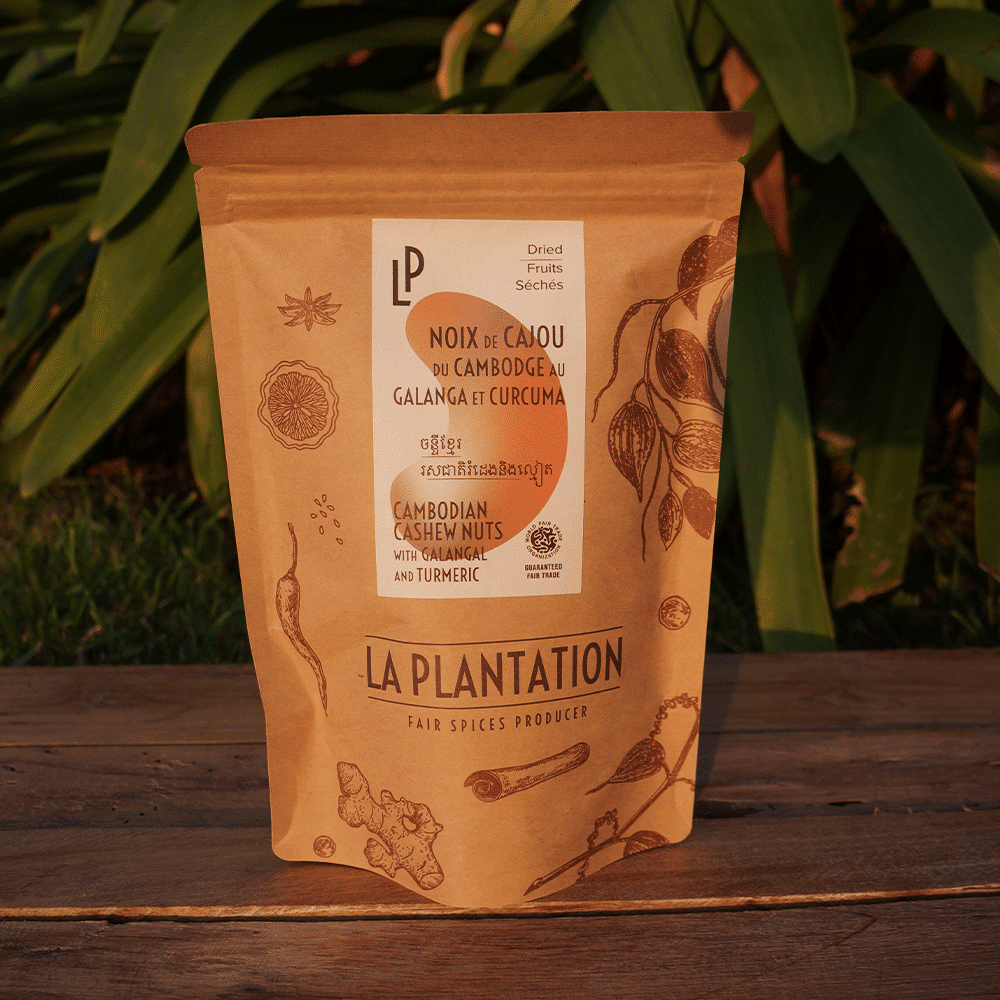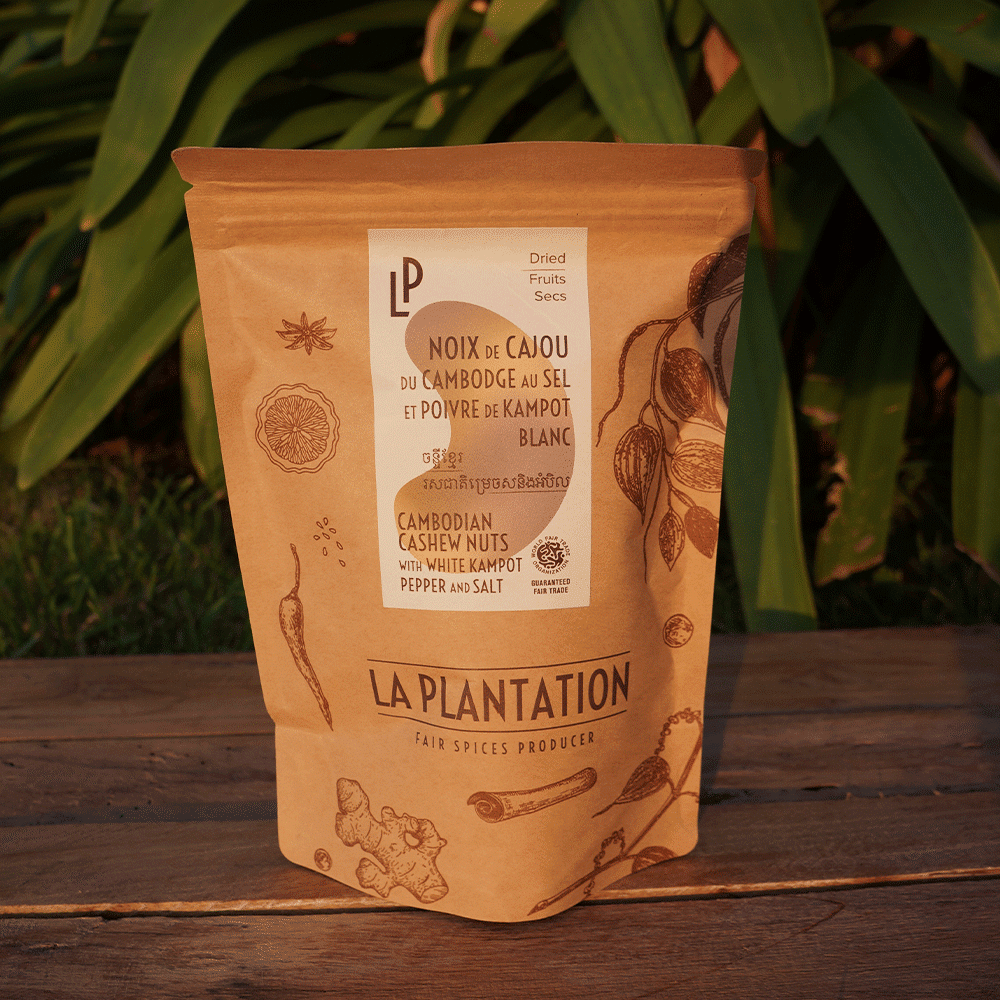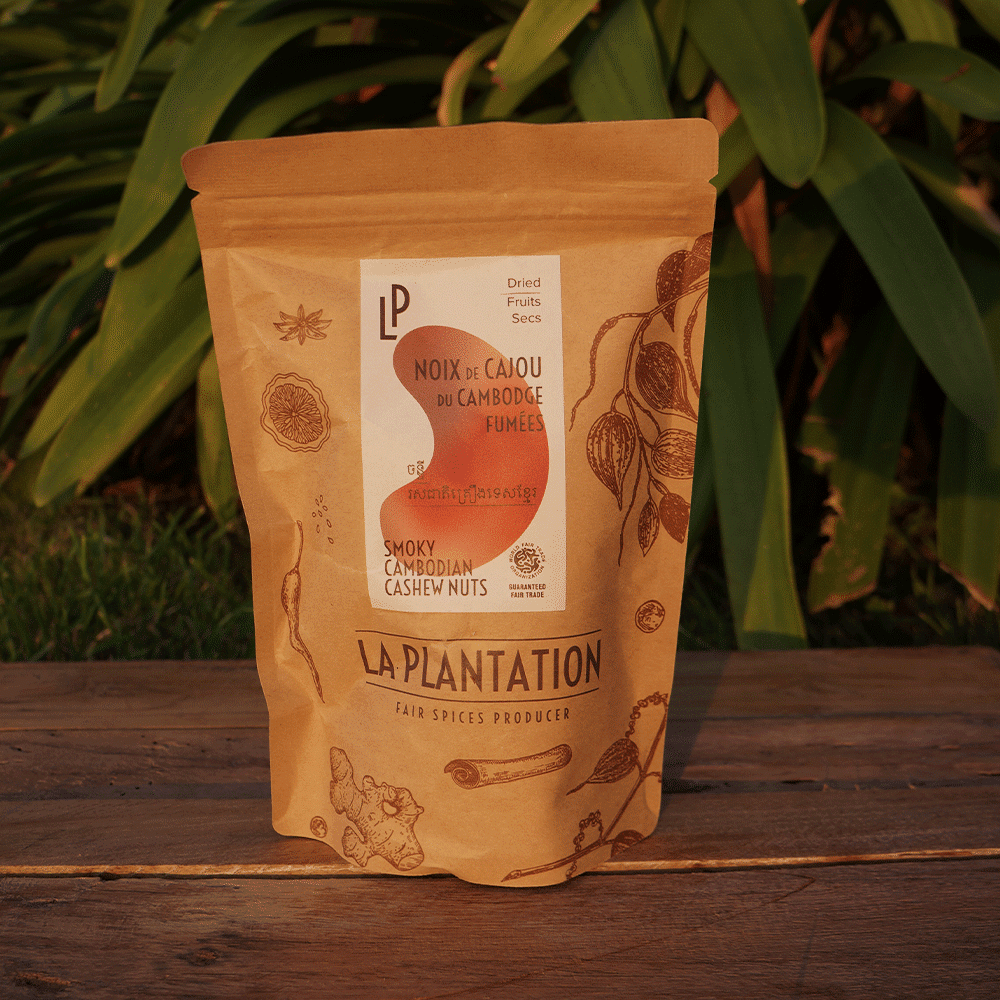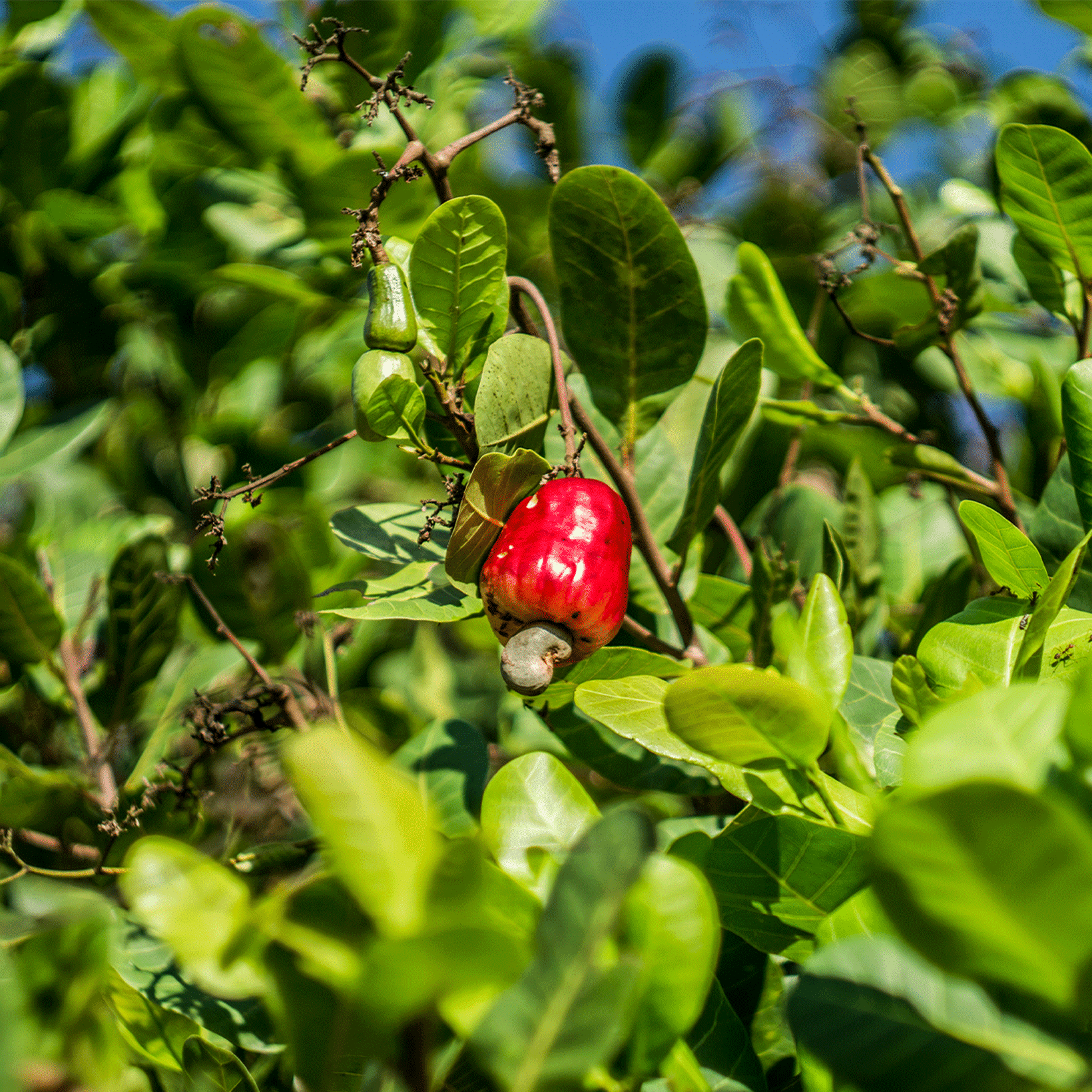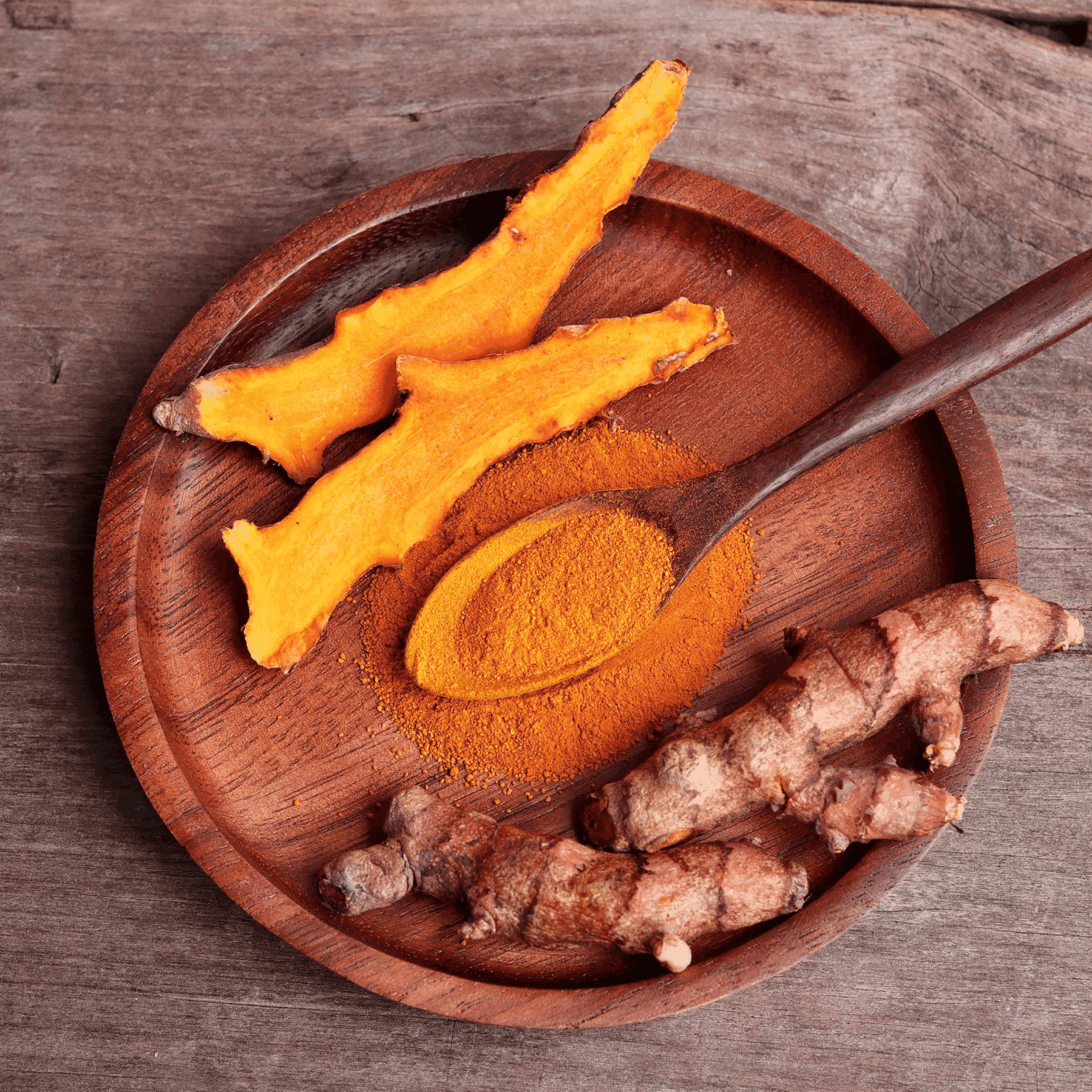
How to use cashew nuts, their health benefits, and nutrition value
Sommaire
Crunchy, creamy, and nourishing, cashew nuts have won hearts all over the world. They are easy to snack on and simple to add to your cooking, making them much more than just a quick bite.
In this article, you will discover how cashew nuts grow, their history, top health benefits, and nutritional value. You’ll also learn many ways to enjoy them in your daily diet — from healthy snacks to flavor-packed recipes, including creative uses like cashew spread or a crunchy topping to enhance your favorite dishes. We will also introduce you to the delicious varieties we offer.
Key takeaways:
|
Origin and history of cashew nuts
How Cashew nuts grow?
Cashew nuts come from the cashew tree (Anacardium occidentale), a tropical tree that thrives in hot, sunny climates with well-drained soil.
The tree produces the cashew apple, a juicy and fragrant fruit, with the cashew nut growing at its tip, inside a hard shell.
This shell contains a caustic resin, so extraction requires special processing. The nuts are dried, heated, and carefully shelled by hand before reaching you in their edible form.
Origin and history
Native to Brazil, cashew trees were spread around the world by Portuguese explorers in the 16th century. Today, Cambodia is one of the top producers, thanks to its fertile soil and skilled farmers. In 2024, it became the 2nd world’s second-largest producer of raw cashew nuts.
Our direct partnership with local farmers ensures traceability, optimal drying, and strict selection for only the finest cashew nuts.
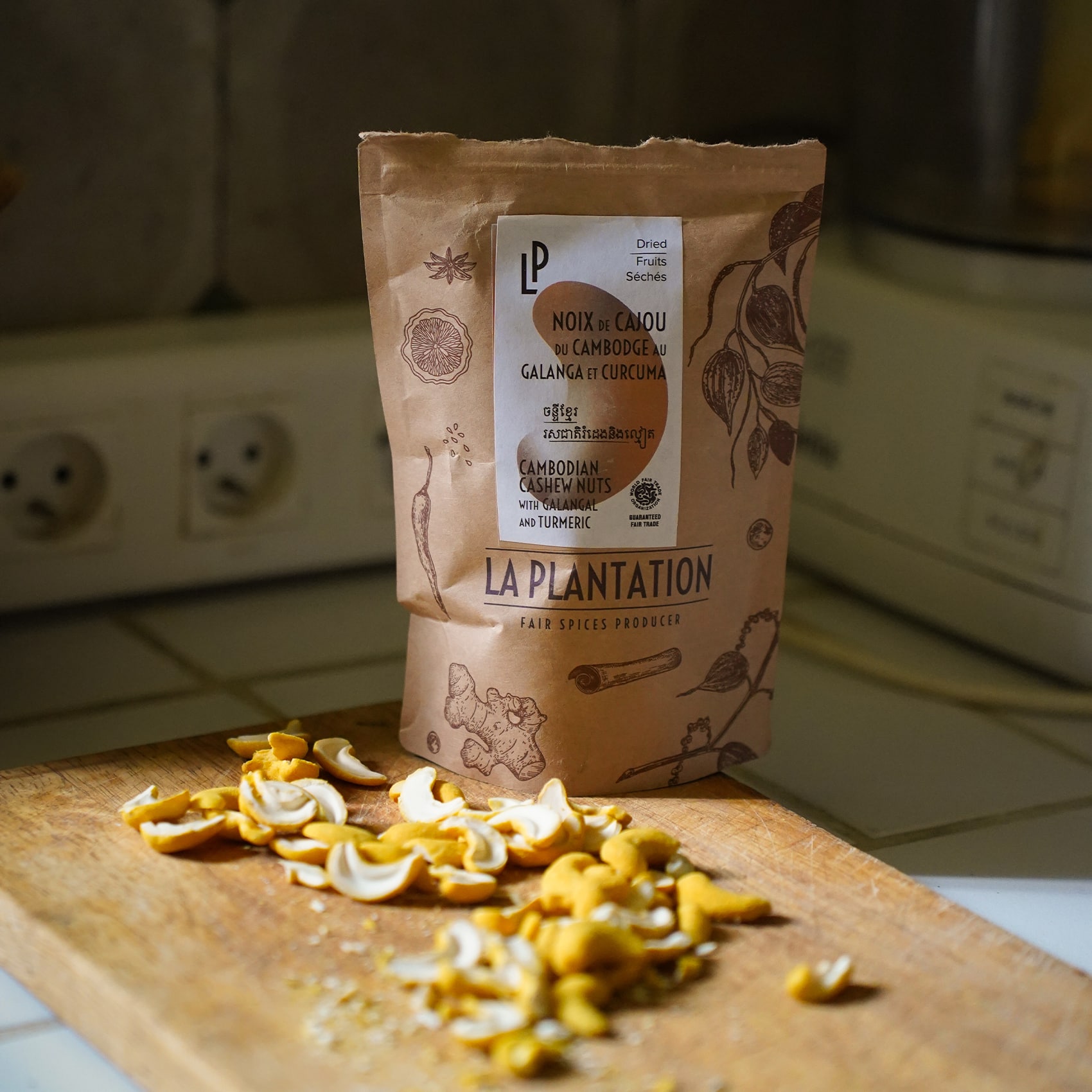
Why eat Cashew nuts?
A nutritious and tasty snack
Cashew nuts are creamy, naturally sweet, and packed with nutrients:
-
Protein: About 20 g per 100 g, supporting muscle maintenance and repair
-
Fiber: Aiding digestion and keeping your gut healthy
-
Healthy fats: Helping reduce bad cholesterol (LDL) and raise good cholesterol (HDL)
A handful of cashews mid-morning or afternoon provides energy and reduces sugar cravings.
A healthy snack: Pair cashew nuts with sweet foods
According to the Glucose Goddess method, eating cashew nuts or other nuts alongside a sweet snack — such as cake, fruit, or a carb-rich dish — can help your body absorb sugars more steadily and avoid a blood sugar spike. This is because the healthy fats in nuts slow down the release of glucose into the bloodstream.
So next time you enjoy a treat, add a handful of cashew nuts. You can even pair our new flavored cashew nut recipeswith your favorite desserts for an extra crunch.
This is a simple health tip that works for the whole family, from kids to adults. For a homemade twist, blend roasted cashews in your food processor to make your own creamy cashew spread.
Cashew nuts health benefits
Beyond their excellent nutrition profile, cashew nuts are known for several key health benefits:
Rich in antioxidants
Cashew nuts are naturally rich in antioxidants like polyphenols and carotenoids. These compounds help protect cells from oxidative stress, slow down signs of aging, and support a strong immune system.
Promote heart health
Thanks to their unsaturated fats, cashew nuts can lower bad cholesterol (LDL) and increase good cholesterol (HDL). This helps reduce the risk of heart disease. Their magnesium and potassium content also helps regulate blood pressure.
Support bone strength
Cashew nuts are an excellent source of magnesium, an essential mineral for strong bones. They also provide phosphorus and copper, which help build bone tissue and maintain healthy joints.
Help muscle recovery and satiety
With their high plant-based protein content, cashew nuts help maintain muscle mass and aid in post-exercise recovery. Their fiber and healthy fats also keep you feeling full for longer, helping reduce snacking.
Cashew nuts: Serving size and precautions
Cashew nuts are nutrient-dense but also calorie-rich. To enjoy their benefits without overdoing it, stick to 30–40 g per day — about a small handful.
Allergy warning: Cashew nuts are tree nuts. If you have a nut allergy, they may cause reactions, so avoid them if you or someone in your family is affected.
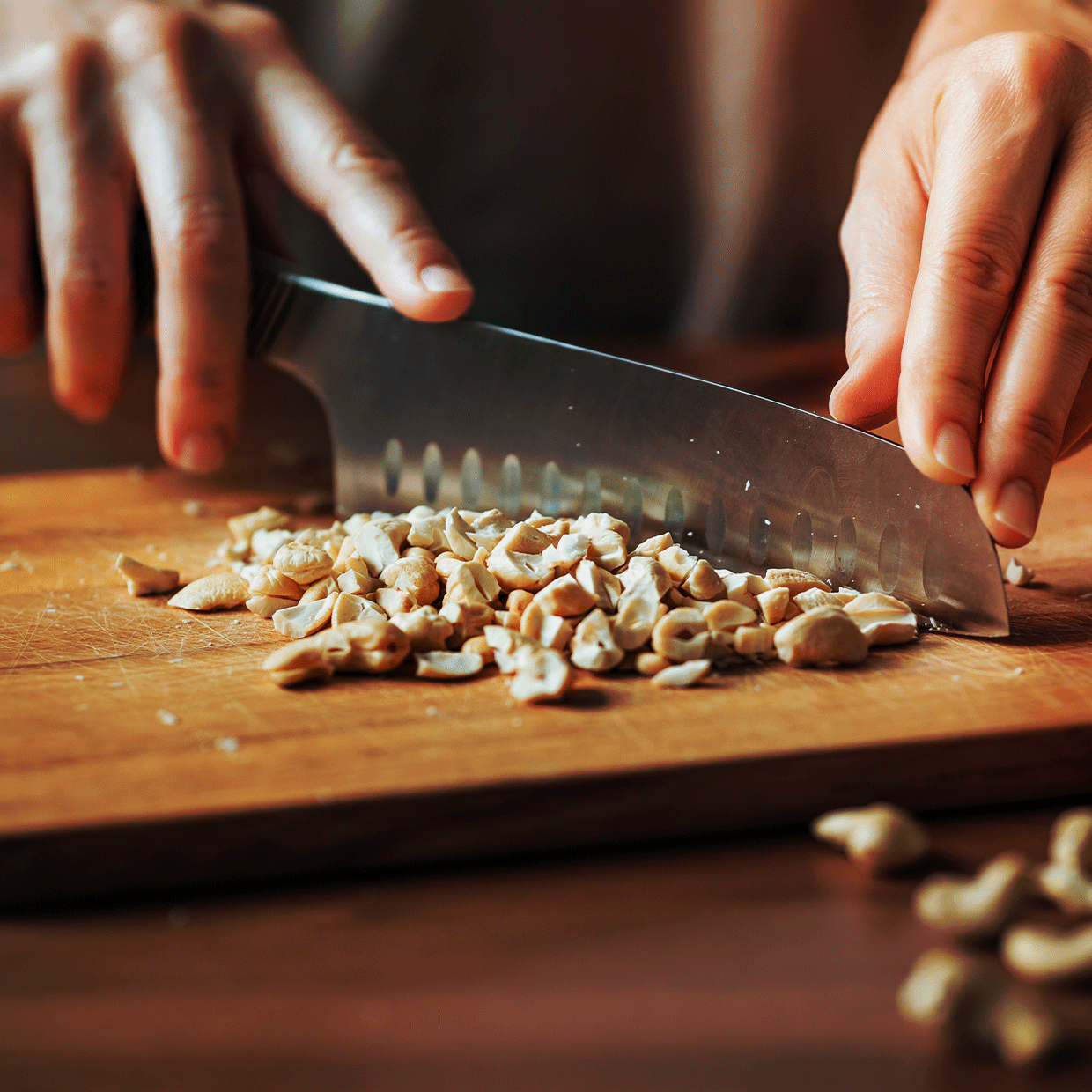
Cashew nuts nutritional values
| Nutrient | Amount |
| Energy | 631 kcal |
| Protein | 19.8 g |
| Carbohydrates | 21.8 g |
| Sugars | 5.3 g |
| Fiber | 4 g |
| Fat | 49.1 g |
| – of which saturated | 9.5 g |
| Magnsium | 247 mg |
| Potassium | 580 mg |
| Iron | 5 mg |
| Vitamin A | 0 µg |
| Vitamin C | < 0.5 mg |
| Vitamin E | 0.9 mg |
| Vitamin K1 | 34.7 µg |
| Vitamin B6 | 0.4 mg |
| Calcium | 41.8 mg |
Nutritional data source: Base Ciqual – Anses
The role of nuts in a balanced diet
Cashew nuts, like other nuts, are a valuable ally for anyone aiming to maintain a balanced diet. They are rich in healthy fats and plant-based protein, making them an excellent substitute for animal protein in vegetarian or flexitarian diets.
How to use cashew nuts in your cooking?
Adding Cashew nuts to savory dishes
Cashew nuts are incredibly versatile in savory recipes:
-
Salad toppings: Lightly crush cashews with a knife or mortar and sprinkle them over vegetable salads or Asian-inspired mixed salads. They add a buttery crunch and enhance flavor. For best texture, add them just before serving.
-
Woks and curries: A classic ingredient in Asian cuisine, cashew nuts pair beautifully with spices and rich sauces. They add both texture and a mild sweetness to balance bold flavors.
-
Creamy sauces: Blend cashews with a little water to create a smooth, creamy base. This is a vegan-friendly alternative to cream or cheese and works well in pasta sauces, dips, or spreads.
-
Soups: Add a spoonful of chopped cashews to creamy soups like butternut squash, tomato, or gazpacho. They bring extra texture and a subtle nutty depth to the flavor.
Adding Cashew nuts to sweet recipes
For desserts, snacks, or breakfast, we recommend using natural cashew nuts or our cashews flavored with galangal and turmeric.
-
Breakfast cereals and porridges: Sprinkle chopped cashew nuts over muesli, granola, or oatmeal. This boosts protein and healthy fats while adding crunch.
-
Desserts: Incorporate cashews into cakes, cookies, or energy balls for a mild nutty flavor and natural creaminess. They pair perfectly with fresh or dried fruits for a balanced taste.
-
Snack time treats: Enjoy a handful of plain or spiced cashew nuts with fruit or yogurt. They bring energy and flavor to your afternoon break.

Complete recipe ideas with cashew nuts
You can explore many delicious recipes where cashew nuts are the star ingredient:
-
A must-have cashew nuts spread that works beautifully on toast or as an ingredient in baking and smoothies.
-
Cashew Caesar sauce: A plant-based twist on the classic Caesar dressing, creamy and full of flavor.
-
Chocolate cashew clusters: A perfect blend of smooth chocolate and the crunchy sweetness of cashew nuts.
-
Fresh spring rolls with smoked cashews: A refreshing recipe combining crisp vegetables with the rich, smoky taste of seasoned cashews.
How to make homemade Cashew milk or Cashew butter?
Cashew milk:
-
Soak 100 g of unsalted cashew nuts in water for 4–8 hours.
-
Rinse, then blend with 750 ml of water until smooth.
-
Strain if desired.
-
Store in the fridge for up to 3 days.
Cashew butter:
-
Place dry-roasted cashews in a powerful blender.
-
Blend for 5–10 minutes until you get a smooth paste.
-
Optional: Add a pinch of salt or a drizzle of neutral oil for texture.
| Testimonial on cashew nuts
“I couldn’t resist the temptation and ended up eating the whole bag in no time. These Jumbo cashews are addictive!” |
Tips for choosing and storing cashew nuts
The quality of cashew nuts depends greatly on their freshness and how they are stored.
-
Store cashew nuts in an airtight container, away from light and moisture.
-
Natural cashews can keep for several months, but it’s best to eat them within 3–6 months after opening.
-
Roasted or spiced cashews keep their flavor but may lose crunch over time, so consume them quickly after opening.
Easy recipe Ideas with cashew nuts
Cashew nuts can be added to many recipes for extra flavor and texture. They work in both sweet and savory dishes.
Here are some simple ideas using spiced cashew nuts:
-
Summer tomato salad with Kampot pepper and salt: Add crushed smoked cashews for extra crunch and protein.
-
Sea bass ceviche: Enhance it with cashews flavored with galangal and turmeric for an Asian twist.
-
Red or green curry: Replace meat with salted cashews and white Kampot pepper for a plant-based protein boost.
-
Granola: Swap dried fruits and cinnamon for galangal and turmeric cashews for a unique flavor.
-
Soba noodle salad: Inspired by Pad Thai or Bò Bún, add crushed cashews for crunch and nutrition.
Cashew nuts are not only delicious — they’re also a healthy, nutrient-rich snack that satisfies cravings while offering many health benefits. Whether you add them to salads, pasta dishes, soups, or desserts, they bring crunch and a unique flavor to your meals.

FAQ
How can I eat cashew nuts every day?
You can eat them raw, roasted, as cashew butter, or as cashew milk. They’re easy to add to smoothies, muesli, savory dishes, creamy sauces, or vegan desserts.
Do cashew nuts make you gain weight?
Not when eaten in moderation. They are calorie-dense, but their fiber and healthy fats promote satiety. In a balanced diet, they can even help control weight.
How many cashew nuts should I eat per day?
The recommended portion is around 30 g per day — about a small handful (15–20 cashews). This is enough to get their benefits without excess calories.
Why soak cashew nuts?
Soaking for 4–6 hours softens cashews, makes them easier to digest, and removes some anti-nutrients. It also gives them a creamier texture for sauces, vegan cheese, or desserts.
Do cashew nuts have medicinal properties?
Yes. They are known for their anti-inflammatory and heart-protective effects. The tryptophan in cashews may help regulate mood and sleep. They are often recommended for fatigue or mineral deficiencies.
